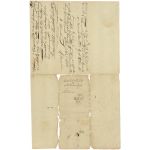Warrant for Punishment in the Case of U.S. v. Matthew Lyon
10/9/1798
Add to Favorites:
Add all page(s) of this document to activity:

Add only page 1 to activity:
Add only page 2 to activity:
Seven years after the Bill of Rights was ratified, guaranteeing freedom of speech, Congress passed the Sedition Act of 1798, prohibiting criticism of the Government. That same year, Congressman Matthew Lyon was convicted for criticizing President John Adams in a newspaper article.
This document is the warrant for punishment (mittimus) for Lyon. It describes the conviction of Lyon, a publisher and member of Congress, for making seditious statements that had been made illegal under the Sedition Act of 1798, and specifies a punishment of four months in jail and a fine of $1,000, plus $60.96 in court costs.
The Sedition Act was allowed to expire two years later.
This document is the warrant for punishment (mittimus) for Lyon. It describes the conviction of Lyon, a publisher and member of Congress, for making seditious statements that had been made illegal under the Sedition Act of 1798, and specifies a punishment of four months in jail and a fine of $1,000, plus $60.96 in court costs.
The Sedition Act was allowed to expire two years later.
This primary source comes from the Records of District Courts of the United States.
National Archives Identifier: 595619
Full Citation: Warrant for Punishment in the Case of U.S. v. Matthew Lyon; 10/9/1798; U.S. v. Matthew Lyon; Case Files, 1792 - 1869; Records of District Courts of the United States, Record Group 21; National Archives at Boston, Waltham, MA. [Online Version, https://www.docsteach.org/documents/document/warrant-matthew-lyon, April 26, 2024]Rights: Public Domain, Free of Known Copyright Restrictions. Learn more on our privacy and legal page.





